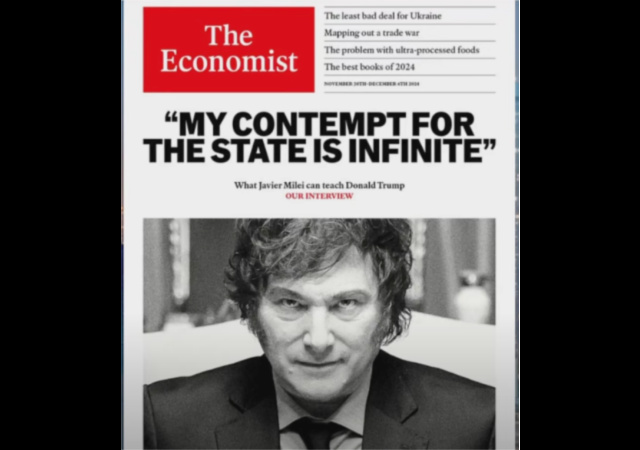The Economist Changes Tune on Javier Milei: Actions Deserve ‘to be Watched Closely Around the World’

No one on the left liked the idea of Javier Milei winning in Argentina, especially The Economist.
The publication has changed its tune since Milei, who has been president for a year, has elevated Argentina with his libertarian ways.
Gee, maybe, just maybe, people should listen to us libertarians.
I know President-elect Donald Trump and those who support him love Milei. However, I have seen nothing from anyone that mirrors what Milei holds dear.
I get trashed by the left and the right for pointing out that Milei doesn’t belong to either side in America.
Yes. Milei is a true libertarian who has embraced small government, free markets, and Austrian economics. That is why Milei is the only politician I genuinely adore and support. I cannot believe I am agreeing with The Economist:
The left detests him and the Trumpian right embraces him, but he truly belongs to neither group. He has shown that the continual expansion of the state is not inevitable. And he is a principled rebuke to opportunistic populism, of the sort practised by Donald Trump. Mr Milei believes in free trade and free markets, not protectionism; fiscal discipline, not reckless borrowing; and, instead of spinning popular fantasies, brutal public truth-telling.—What is fascinating is the philosophy behind the figures. Mr Milei is often wrongly lumped in with populist leaders such as Mr Trump, the hard right in France and Germany or Viktor Orban in Hungary. In fact he comes from a different tradition. A true believer in open markets and individual liberty, he has a quasi-religious zeal for economic freedom, a hatred of socialism and, as he told us in an interview this week, “infinite” contempt for the state. Instead of industrial policy and tariffs, he promotes trade with private firms that do not interfere in Argentina’s domestic affairs, including Chinese ones. He is a small-state Republican who admires Margaret Thatcher—a messianic example of an endangered species. His poll ratings are rising and, at this point in his term, he is more popular in Argentina than his recent predecessors were.
Milei practices what he preaches.
In one year, Milei’s policies have reduced Argentina’s inflation from 13% to 3%. Investors’ fear has dropped by 50%. Slashing cost controls have blossomed housing and lowered costs.
I didn’t even get mad when The Economist said everything could go wrong. But everything has risks. However, Milei’s ways have a smaller chance of risks than government control.
But The Economist admitted the problems facing the world, which could go down if leaders paid attention:
Nonetheless, and despite the fact that Argentina is a very unusual country, Mr Milei’s first year holds lessons for the rest of the world, including his admirers and detractors in America. Take the growth of the state. Global public debt has risen from 70% of gdp 20 years ago to 93% this year and will hit 100% by 2030. Debt is a scourge not only in rich countries but also in China and India, which are both running vast deficits.The financial crisis and the pandemic raised borrowing and created a sense that the government will always step in when people are in adversity. Many countries face rising health-care and pension costs as the population ages. Regulations only ever seem to accumulate. Governments are at a loss as to how to break the cycle. In some places, such as France, the prospect of doing so threatens political chaos.
One of the best things about Milei is his delivery. The man is over the top, but he is consistent:
Perhaps the biggest lesson is about courage and coherence. Like them or not, Mr Milei’s policies align with each other, which magnifies their effect. Unlike Mr Trump, he has not promised to unleash the power of markets and consumers in one breath, and to protect businesses from competition in the next. By winning the argument for tough but vital reform, he has shown that voters used to sugar-coated banalities can in fact be trusted with hard truths.
Milei does not sugarcoat anything. He admitted it won’t be painless. The Economist encouraged world leaders to pay attention to “his attempt to confront, coherently and systematically” to fix “a near-universal problem.”
I encourage you to read the full interview with Milei.
CLICK HERE FOR FULL VERSION OF THIS STORY